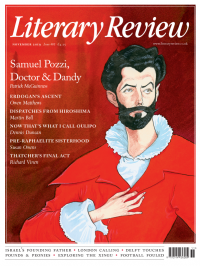Josie Mitchell
A House But Not a Home
The Dutch House
By Ann Patchett
Bloomsbury 337pp £18.99
It is a strange feeling to gaze at a familiar house, a one-time home, knowing that someone else now has the keys. In Ann Patchett’s The Dutch House, the siblings Danny and Maeve are consumed by this sense of dispossessed longing. Losing their parents at a young age, and exiled from the house by their stepmother, Andrea, they return month on month, year on year, to stare up at their old home, seeking out silhouettes in the windows.
‘Do you think it’s possible to ever see the past as it actually was?’ Danny asks Maeve, from their parked car across the street. This is the question that drives Patchett’s eighth novel. The object of their obsession is an eccentric mansion in Philadelphia, with six bedrooms on the second floor and a ballroom on the third. It’s a building full of curios, gilded cornices and portraits of other people’s ancestors.
‘Habit is a funny thing,’ Danny admits. ‘You might think you understand it, but you can never exactly see what it looks like when you’re doing it.’ Trauma traps people in cycles of return. Patchett’s characters return hungrily to the source of their suffering: the original fall from

Sign Up to our newsletter
Receive free articles, highlights from the archive, news, details of prizes, and much more.@Lit_Review
Follow Literary Review on Twitter
Twitter Feed
Under its longest-serving editor, Graydon Carter, Vanity Fair was that rare thing – a New York society magazine that published serious journalism.
@PeterPeteryork looks at what Carter got right.
Peter York - Deluxe Editions
Peter York: Deluxe Editions - When the Going Was Good: An Editor’s Adventures During the Last Golden Age of Magazines by Graydon Carter
literaryreview.co.uk
Henry James returned to America in 1904 with three objectives: to see his brother William, to deliver a series of lectures on Balzac, and to gather material for a pair of books about modern America.
Peter Rose follows James out west.
Peter Rose - The Restless Analyst
Peter Rose: The Restless Analyst - Henry James Comes Home: Rediscovering America in the Gilded Age by Peter Brooks...
literaryreview.co.uk
Vladimir Putin served his apprenticeship in the KGB toward the end of the Cold War, a period during which Western societies were infiltrated by so-called 'illegals'.
Piers Brendon examines how the culture of Soviet spycraft shaped his thinking.
Piers Brendon - Tinker, Tailor, Sleeper, Troll
Piers Brendon: Tinker, Tailor, Sleeper, Troll - The Illegals: Russia’s Most Audacious Spies and the Plot to Infiltrate the West by Shaun Walker
literaryreview.co.uk